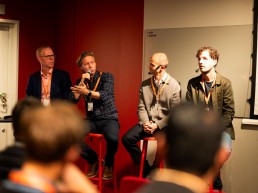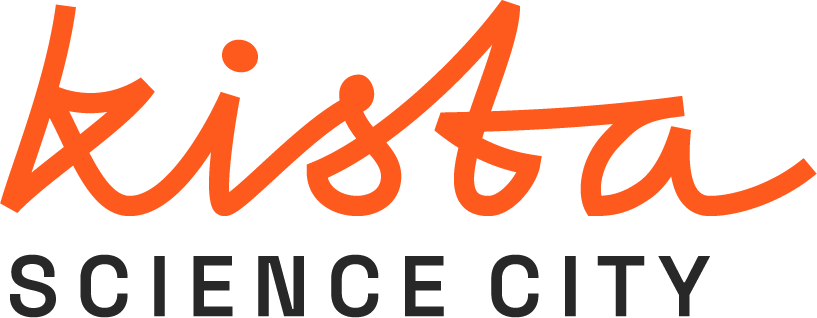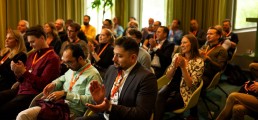Nationellt forum för trygghet i stadsrummet - fokus på integritet och etik
En ny nationell mötesplats ska fokusera på hur vi kan utveckla kloka IoT-lösningar som kan att öka tryggheten i det offentliga rummet, samtidigt som individens integritet skyddas.
Trygghet på gator och torg är ett komplext problem som kräver innovativa arbetssätt. Nya teknologier, som IoT-sensorer och artificiell intelligens (AI), har stor potential att bidra till att minska otryggheten. Sensorer kan användas för att observera ljusförhållanden och trafikflöden, vilket kan bidra till en mer inbjudande miljö. Sensorer är också intressant för att förstå hur invånare använder allmänna platser. AI kan användas för att analysera data från sensorerna och identifiera både potentiella risksituationer som situationer som upplevs trivsamma. En sådan analys bidrar till ökad kunskap om nuläge samt kan effektivisera de insatser som görs för att öka attraktivitet och upplevd trygghet.
Det är dock viktigt att nya teknologier används på ett ansvarsfullt sätt och då krävs en mycket god förståelse för integritet och etik.
Tidigare i år startades Trygghetslabbet i Kista, ett innovationslabb som samlar företag, fastighetsägare, kommuner och akademi för att utveckla nya arbetssätt för ökad trygghet i staden. Trygghetslabbet bidrar också till att utveckla marknaden för ny teknik och skapa nya affärer. Här pågår under hösten en pilot som undersöker integritetsfrågor i samband med mätning av vistelsemönster på gator och torg. Piloten genomförs tillsammans med Stockholms stad, IoT Sverige och Integritetsskyddsmyndigheterns (IMY) regulatoriska testverksamhet.
Nu kompletteras Trygghetslabbet med ett nytt strategiskt projekt på uppdrag av IoT Sverige. Svenska städer som arbetar aktivt med trygghet i staden och Internet of Things-tekniker samlas till en nationell mötesplats, ett forum, för erfarenhetsutbyte och lärande. Forumet kommer att fokusera på integritet, som är adresserat i dataskyddsförordningen (GDPR), och etik.
Forumet är ett samarbete mellan Kista Science City, IoT Sverige och flera svenska städer som arbetar aktivt med att hitta lösningar för ökad trygghet i staden.
Unikt för forumet är att det samlar många olika roller, från kommuner, städer och även leverantörer och experter. Detta möjliggör många perspektiv i diskussioner om komplexa frågor, något som varit efterfrågat.
Vanessa Ware, projektledare på Kista Science City, säger att samarbete och kunskapsdelning är avgörande för att utvecklahållbara lösningar på problemet med trygghet i offentliga miljöer. ”Genom att samlas och dela kunskap kan vi superboosta utvecklingen av ett komplext område som trygghet på allmänna platser. Det här forumet är nischat och till för dem som ligger i framkant. Området har stor potential och när vi hjälps åt kan vi komma framåt snabbare och lyckas skapakloka lösningar för den hållbara staden,” säger Vanessa.
Under hösten 2023 kommer forumet att erbjuda en serie workshops för att stärka deltagarnas kunskap och kompetens inom området.
Målsättningen är att stärka deltagarna i forumet i området juridik och etik inom trygghet i offentlig miljö och IoT samt att identifiera möjligheter och utmaningar att arbeta vidare med.
Bo Baudin, IoT Sverige, menar att det är viktigt att beakta integritets- och etiska aspekter i tidigt i utvecklingen av nya datadrivna tillämpningar
“Det arbete vi nu gör inom området trygghet i stadsrummet kommer bidra generellt till hur vi bäst arbetar med integritet och etik i utvecklingen av Internet of Things” , säger Bo Baudin, IoT Sverige.
Företag som är intresserade av att delta eller veta mer kan kontakta Vanessa Ware!
Läs mer om arbetet som sker inom trygghet med hjälp av ny teknik.
Welcome Week
Welcome Week
Reflecting on Welcome Week 2023, an initiative for connecting companies and students in the vibrant tech scene of Kista Science City.
As an annual highlight in Kista’s tech calendar, Welcome Week brings together academic life and professional opportunities. The week offers a unique platform for local companies to showcase their work and to network with the next generation of talent. Both newcomers and returning students have seized the opportunity to gain a deeper understanding of the community that they are becoming a part of.
Welcome week includes a range of collaborative activities, from industry-focused seminars to casual networking lunches and interactive tech demos. Students gain valuable insights into the diverse career paths and opportunities that Kista’s ecosystem offers beyond academia, enriching the educational journey with real-world perspectives.
Mikaela Färnqvist, Community Manager at Kista Science City, shares her thoughts on the week:
”Welcome week is all about bringing people together. During these events, we see key players from the tech industry meet and connect with the students here in Kista. I’m really looking forward to seeing what new opportunities will come from the meetings.”
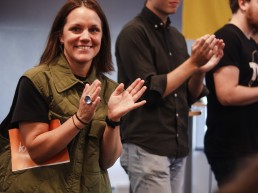
Welcome Week is an annual, collaborative effort involving several Kista businesses and academia centers, including and DISK / Stockholm University, IN-sektionen / KTH, Ericsson, Fujitsu, and IBM.
For companies, this event provides a great opportunity for connections with students, not just during Welcome Week, but also year-round.
Reach out to Mikaela if you want to participate in next event.
Navigating the skies: Drones and urban mobility
Navigating the skies: Drones and urban mobility
How can drones help cities become safer, more efficient, and sustainable? During Mobility Day 2023, experts in urban mobility and drone technology gathered for a panel discussion on this topic, addressing the transformative potential and challenges of integrating drones into urban transportation systems.
In the evolving urban environments of today, drones are rapidly becoming integral to modern urban transport strategies. The panel – featuring representatives from RISE, The City of Stockholm, Ericsson Drone Mobility, Region Stockholm, ATS Bromma and LFV – emphasized that drones have the potential to redefine a broad range of services. From efficient package deliveries to life-saving medical supplies like automated defibrillators, drones offer a flexible and eco-friendly alternative to traditional transport methods. With the right infrastructure, it’s anticipated that drone transport could replace up to 75% of express deliveries in the future.
However, innovation doesn’t come without its challenges. Regulatory constraints present a significant bottleneck, especially around permits and urban airspace ownership. Navigating these legal frameworks involves coordination between different layers of governance – from local municipalities to EU level. The panel also underscored behavioral challenges, noting that public perceptions, concerns and acceptance of drones in urban spaces play a vital role in their successful integration. There’s need for ongoing conversations, not just among cities, innovators, and policymakers, but also with the public to streamline regulations and create a supportive setting for drone integration into urban mobility.
On the technical side, allowing drones to operate beyond the pilot’s visual range brings up some specific challenges. These include not just limited control range but also concerns in other areas like data security and public safety, especially in high-density urban areas. During the panel discussion, it was noted that advancements in 5G connectivity are essential for improving the reliability and safety of drone operations in these settings. This technological progress, in turn, requires close cooperation between drone companies and mobile network providers to fine-tune network performance specifically for drones.
In conclusion, tackling these challenges calls for a collaborative, multi-disciplinary approach. The path forward lies in aligning not just on regulations but also on infrastructure, financing, and, not least, public acceptance. By establishing a shared vision and mutual understanding among all stakeholders, the acceleration of drone deployment in cities becomes not a question of “if” but “when”. As cities like Stockholm aim for ambitious sustainability goals, drone integration stands as a powerful means to achieve them.
Thanks to our panelists for contributing to this discussion:
Rasmus Lundqvist of RISE
Erik Levander of The City of Stockholm Transport Department
Anders Carlsson of ATS Bromma, LFV
Fredrik Flyrin of Ericsson Drone Mobility
Fredrik Engströmer of Region Stockholm
Karolina Pamp of Kista Science City
Learn more about ongoing activities in the area of Drones and Urban air mobility.
Reach out to Karolina if you want to talk more!
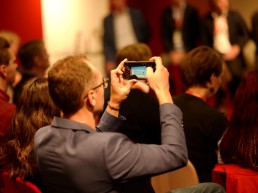
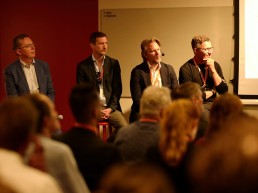
The power of data sharing
Towards sustainable mobility: The power of data sharing
How can data make our transportation systems more efficient, eco-friendly, and tailored to people’s needs? A session during Mobility Day 2023 took on this big question, with experts in the field discussing how data isn’t just about numbers – it’s a key tool for making urban mobility smarter and more sustainable.
The panel – featuring representatives from Voi Technologies, The Swedish Transport Administration, The City of Stockholm and Univrses – highlighted the critical role of data in shaping a sustainable future for urban mobility.
The key takeaway was clear: relevant and actionable data is a critical element in creating transportation systems that are both resource-efficient and aligned with the needs of the community. For instance, the use of connected vehicles was described as a game-changing approach to collecting detailed data on traffic flow and user behavior, which can then inform everything from day-to-day road maintenance to long-term urban planning initiatives.
Shifting from the mere collection of data, the discussion also touched on its real-world applications. For transformative change, data needs to be part of multi-disciplinary strategies involving software developers, urban planners, and policymakers alike. This is where standardization becomes crucial. Consistent data-sharing protocols, developed and maintained at both national and international levels, were mentioned as a driving-force for the next big leaps in transportation efficiency and sustainability.
The panel also emphasized that the value of data goes beyond guiding vehicles or informing decision-makers; it’s also key in shaping public behavior and influencing policy. Understanding travel patterns and time metrics, for example, can help refine the system and ultimately encourage more sustainable mobility choices. Ethical considerations, particularly regarding data privacy and compliance with GDPR guidelines, were underscored as essential for responsibly moving towards a data-driven future.
Looking ahead, it’s clear that data and data-sharing will be central in advancing more sustainable and efficient mobility solutions, not least in urban areas. Working together – across industries and borders – is key. As Stockholm and Sweden work towards meeting ambitious sustainability goals, the effective use of data stands out as a common thread tying many efforts together.
Thanks to our panelists for contributing to this interesting discussion!
Gustaf Soldan Patrikson of Voi Technologies
Anders Asp of The Swedish Transport Administration
Robin Billsjö of The City of Stockholm
Jonathan Selbie of Univrses
Lucas Uhlén of Kista Science City
Curious about the topic and want to talk more? Reach out to Lucas!
